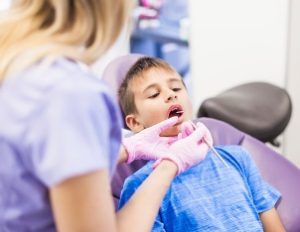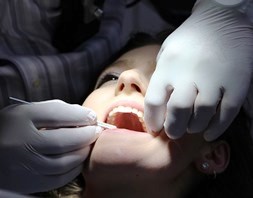Dental Hygiene Training Programs
How to Find the Best One Near Lower New Jersey
 A critical first step to launch your new vocation in preventive dentistry is to choose the right dental hygienist college near Lower NJ. However, you need to examine and compare your school options prior to making your final choice. There is far more to performing your due diligence than selecting the training with the least expensive tuition or enrolling in the school that is closest to your residence. There are other important issues to consider also, including the program's accreditation and reputation. A dental hygienist generally must invest anywhere from two to three years to earn an Associate Degree, in contrast to a certificate typically earned by dental assistants in about a year. Naturally with the lengthier training of a hygienist comes more expense. We will explore all of these factors and additional questions that you need to be asking the dental hygienist programs you are analyzing later in this article. But first, let's review the roles of dental hygienists and the training programs provided.
A critical first step to launch your new vocation in preventive dentistry is to choose the right dental hygienist college near Lower NJ. However, you need to examine and compare your school options prior to making your final choice. There is far more to performing your due diligence than selecting the training with the least expensive tuition or enrolling in the school that is closest to your residence. There are other important issues to consider also, including the program's accreditation and reputation. A dental hygienist generally must invest anywhere from two to three years to earn an Associate Degree, in contrast to a certificate typically earned by dental assistants in about a year. Naturally with the lengthier training of a hygienist comes more expense. We will explore all of these factors and additional questions that you need to be asking the dental hygienist programs you are analyzing later in this article. But first, let's review the roles of dental hygienists and the training programs provided.
It Takes Just a Few Minutes to Start Your Dental Hygienist Career Below
Dental Hygienist Job Duties

When comparing the duties of a dental assistant to that of a hygienist, the biggest difference is undoubtedly that the hygienist works more on their own. Dental assistants work with and assists the Lower NJ practice and the dentists. Hygienists, while also assisting the practice, deal with the patients more on an individual basis. They are typically the first person a patient sees when called from the waiting room. They examine each patient's teeth and gums and present their findings to the dentists. They also may carry out basic procedures. Depending on state law, a hygienist's duties can include:
- Removing plaque, tartar and stains
- Applying fluoride treatments
- Applying sealants and polishing teeth
- Instructing patients about oral care
- Taking X-rays and developing film
- Applying fillings and removing sutures
Dental Hygienist Education Options
Due to the added responsibility as compared to an assistant, dental hygienists working in Lower NJ dental practices are generally required to hold an Associate Degree in dental hygiene rather than a certificate. These programs can take anywhere from two to as long as three years to complete and must be accredited by the CDA in virtually every state. They are offered in community colleges as well as trade and technical schools. And in addition to classroom studies learning the fundamentals of dental hygiene, there will be a clinical aspect to the training as well. A number of programs also offer internships with local dental practices or dentists.Dental Hygienist Online Colleges
 Enrolling in an online dental hygienist college can be a great alternative for getting your education. Just remember that the classes will not be 100% online, since there will be a practical portion to your training. But the remainder of your classes will be available by means of your desktop computer in the comfort of your Lower NJ home or elsewhere on your tablet or laptop. For those working while attending college, online dental classes make education a lot more accessible. Many may even offer lower tuition fees than their on-campus competitors. And supplementary expenses for items like commuting, books and school supplies may be lessened also. The clinical training can typically be completed at a community dental practice or in an on-campus lab. With both the clinical and online training, everything required to receive the proper education is furnished. If you have the dedication for this method of education, you may find that attending an online dental hygienist program is the right option for you.
Enrolling in an online dental hygienist college can be a great alternative for getting your education. Just remember that the classes will not be 100% online, since there will be a practical portion to your training. But the remainder of your classes will be available by means of your desktop computer in the comfort of your Lower NJ home or elsewhere on your tablet or laptop. For those working while attending college, online dental classes make education a lot more accessible. Many may even offer lower tuition fees than their on-campus competitors. And supplementary expenses for items like commuting, books and school supplies may be lessened also. The clinical training can typically be completed at a community dental practice or in an on-campus lab. With both the clinical and online training, everything required to receive the proper education is furnished. If you have the dedication for this method of education, you may find that attending an online dental hygienist program is the right option for you.
Points to Cover With Dental Hygienist Schools
Now that you have decided to become a dental hygienist in Lower NJ, you can begin the procedure of comparing programs and schools. As we discussed at the opening of this article, a number of prospective students begin by checking out the cost and the location of the colleges. Perhaps they search for several online alternatives as well. Even though these are important initial considerations, there are a few additional questions that you need to address to the programs you are comparing in order to arrive at an informed decision. To start that process, we have provided a list of questions to assist you with your evaluation and final selection of the best dental hygienist program for you.
Is the Dental College Accredited? There are several valid reasons why you should only enroll in an accredited dental hygienist school. If you are going to become certified or licensed, then accreditation is a condition in virtually all states. In order to take the National Board Dental Hygiene Exam, your dental college must be accredited by the Commission on Dental Accreditation (CDA). Accreditation also helps establish that the instruction you get is of the highest quality and comprehensive. Lower NJ employers often desire or require that new hires are graduates of accredited programs. And last, if you are applying for a student loan or financial aid, frequently they are not available for non-accredited colleges.
Is Enough Clinical Training Included? Clinical or practical training is an essential part of every dental training program. This holds true for the online school options as well. Most dental hygienist programs have partnerships with local dental practices and clinics that furnish clinical training for their students. It's not only important that the program you enroll in provides adequate clinical hours but also provides them in the kind of practice that you ultimately would like to work in. For example, if you have an interest in a career in pediatric dentistry, confirm that the college you enroll in offers clinical rotation in a local Lower NJ dental office that specializes in dental care for children.
Is There an Internship Program? Verify if the dental schools you are exploring sponsor internship programs. Internships are probably the best means to get hands-on, practical experience in a real dental practice. They make it easier for students to transition from the theoretical to the practical. They can also help students develop working relationships in the professional dental community. And they look good on resumes as well.
Is Job Placement Support Offered? Most students that have graduated from dental hygienist schools require assistance landing their first job. Ask if the programs you are researching have job placement programs, and what their job placement rates are. Programs with higher job placement rates are likely to have good reputations within the Lower NJ dental community as well as large networks of contacts where they can position their students for employment or internships.
Are the Classrooms Smaller? Check with the colleges you are evaluating how big on average their classrooms are. The smaller classes tend to offer a more intimate setting for training where students have greater access to the teachers. On the other hand, larger classes often are impersonal and provide little individualized instruction. If feasible, ask if you can monitor a few classes at the Lower NJ dental hygienist college that you are leaning toward so that you can experience first hand the degree of interaction between teachers and students before enrolling.
What is the Total Expense of the Program? Dental hygiene training can differ in cost depending on the duration of the program and the amount of clinical training provided. Other factors, such as the reputations of the colleges and if they are public or private also have an impact. But along with the tuition there are other substantial costs which can add up. They can include expenses for such things as textbooks and commuting as well as school materials, equipment and supplies. So when analyzing the cost of schools, don't forget to include all of the costs related to your education. The majority of colleges have financial assistance offices, so make sure to find out what is offered as far as loans, grants and scholarships in the Lower NJ area.
Are the Classes Convenient? Before enrolling in a dental hygienist school, you need to verify that the hygienist or assistant program provides classes that suit your schedule. This is especially true if you continue working while getting your education and have to go to classes near Lower NJ in the evenings or on weekends. And even if you choose an online program, you will still have to schedule your clinical training classes. Also, while addressing your concerns, ask what the make-up practice is if you should need to miss any classes due to illness, work or family issues.
Learn More About Studying to Become a Dental Hygienist in Lower
Pick the Right Lower Dental Hygienist School
Picking the right dental hygienist program is essential if you intend to take the National Board Dental Hygiene exam or, if required in your state, become licensed. As you now know, there are many options available to receive your education and it takes a relatively short period of time to become a dental hygienist. You can receive your formal education through dental hygienist programs at community colleges, trade schools, vocational schools and technical institutes. Graduates of these schools normally obtain an Associate Degree. Dental Hygienists usually require approximately 2 years of studies before they enter the job market. When obtaining a degree you can choose to go to classes on-campus or online. Whichever mode of training you elect to pursue, by asking the questions presented in this article you will be in a better position to make the appropriate selection. And as a result, you will be ready to commence your journey toward becoming a dental hygienist in Lower New Jersey.
Lower Dental Hygienist Programs Online | Lower Dental Hygienist Schools
